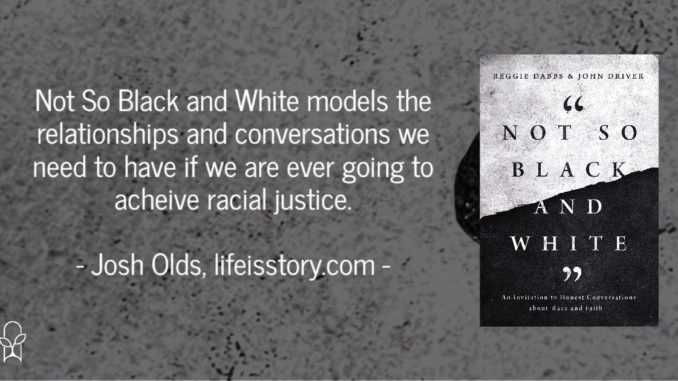
Published by Zondervan on October 12, 2021
Genres: Non-Fiction, Christian Life, Racial Reconciliation
Buy on Amazon
Goodreads

As seen on Good Morning America!
Reggie Dabbs and John Driver--a Black man and a white man, and longtime friends--engage in a courageous, respectfully honest, challenging exploration of racism in America, including how Black and white Christians can come together to fight the evils of racism within our hearts and our systems, including our churches.
White privilege. Black Lives Matter. George Floyd. When it comes to racism in America, many of us feel confused, overwhelmed, angry--and eager to know how to engage in meaningful conversations and actions surrounding such a difficult topic. In Not So Black and White, public school communicator and internationally acclaimed speaker Reggie Dabbs and pastor John Driver team up to offer a hope-filled, convicting, inspiring look at how to be anti-racist in America today.
Through Reggie and John's honest conversations, you will:
Hear the stories of fellow believers who have found ways to reach across the racial barrier with humility, empathy, and forgivenessUnderstand a simple yet robust history of racism in America and in the church, including its role in systems, policies, and individual actionsDiscover fully biblical yet culturally wise responses to the challenges of racism in yourself and your communityCome away with fresh thought processes and practical steps for what you can do to think rightly and engage bravely in conversations and actions to end racismNot So Black and White is a compelling resource for pastors, teachers, and community leaders who want to read about issues of racism from a biblical and a historical perspective. For readers of all denominations and backgrounds, Not So Black and White equips us to engage together in the intentional work of dismantling racism, just as the gospel calls us to do.
Two long-time friends, one Black and one white, join together for a conversation about race. While the content of Not So Black and White can be found in any number of books, it’s the camaraderie between the authors that makes this book stand out as it models the type of relationships and conversation that need to be developed in order to come together and fight the evils of racism.
One of the problems with the way evangelical Christianity tends to define racism is that it’s seen as something personal and individual—“We need heart change.” And while that’s not wrong, it ignores the way racism has worked its way into our systems and benefits those who “don’t have a racist bone in their body.” To correct this, a lot of secular antiracist ideology focuses on systemic change. And white evangelicals, long in power because of those systems, are loathe to see them go. So the fight begins between whether reform should be personal or systemic. Reggie Dabbs and John Driver have the answer—it’s both. And “we can’t wait for heart change to occur before we address unjust systems (p. 37).”
Not So Black and White provides a discussion of racism that’s steeped in history (Driver is a pastor with a degree in history) and personal experience (Dabbs grew up impoverished and a victim of racist ideology). They provide a nuanced and substantive conversation that focuses a lot on how the racist systems of the past live on in the background of life today. The argument that “That happened a long time ago” isn’t only incorrect from a factual standpoint (people alive today suffered through segregated schools and society) but it’s incorrect from the standpoint of how the past stays with us—both in our own selves and in our systems.
Further chapters talk about white privilege—what it is and isn’t—and how, especially in the South, history has been rewritten to downplay the role of slavery in the conflict. There’s a chapter on Christian nationalism and one on systemic racism. Not So Black and White dives into the fairly recent past to show how modern conflicts have precedents from previous generations. And through it all, Dabbs and Driver remain conversational, knowledgeable, and irenic.
Whenever I read a book like this, I see what could be. I’m not altogether convinced that we’ll get there. But if we do, it’ll be because of books like this, modeling the conversations and relationships we need to have to pursue justice.
